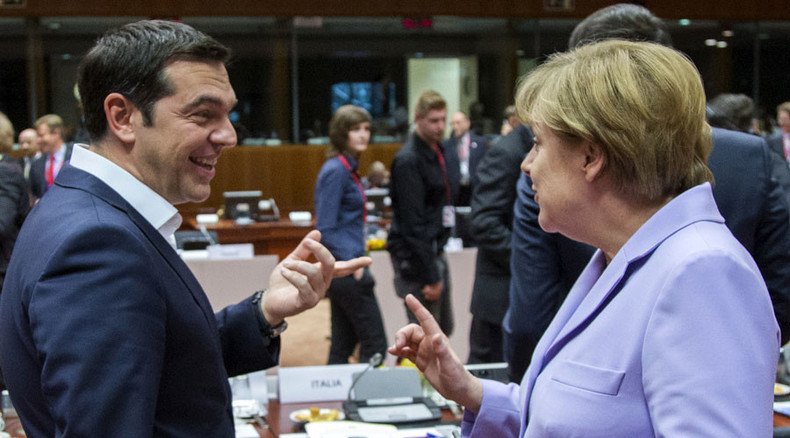Athens, creditors close to final accord on €86bn bailout – media

Greece is expected to ink the final signatures on a vital €86-billion bailout deal with its international creditors in the coming days. However, Greece’s biggest creditor, Germany, still has some reservations.
Greece and its lenders have reached a deal on final fiscal targets, which are intended to help the indebted nation achieve a budget surplus by 2016, Reuters quoted an official as saying on the sidelines of the talks in Athens. “The targets for the primary budget have been finalized,” the source said.
The new targets project a primary budget deficit of 0.25 percent of gross domestic product (GDP) for 2015, and then a surplus of 0.5 percent in 2016, 1.75 percent in 2017, and 3.5 percent in 2018.
“It was also agreed that no new measures would be introduced in 2015 and 2016,” the official added.
A full agreement on a third bailout to Athens is expected to be reached by the August 20 deadline, when Greece has a €3.2-billion debt repayment due to the European Central Bank (ECB), EU diplomats say. Athens expects to conclude the talks on the bailout deal by early Tuesday at the latest, a Greek official told Reuters.
Previously, Greek officials pointed to August 18 as the latest date for the accord to be agreed. The latest round of talks on the vital multi-billion euro bailout started on Sunday and stretched into the early hours of Monday.
"Efforts are being made to conclude the negotiations, the horizon is by Monday night or early Tuesday," said an unnamed Greek official.
The new bailout deal will consist of two articles – one being the loan agreement and the MoU (memorandum of understanding) and the other, prior actions, or measures Athens will need to take in return for the bailout money, the official said.
READ MORE: Greece hopes to complete bailout talks by August 20
Athens hopes to receive the first tranche of at least €20 billion as soon as the assistance package is approved. Some €12 billion from the sum would be allocated for debt repayments, €10 billion for recapitalization of Greek banks and the remainder, €5.3 billion, would reduce debts to state suppliers, the Financial Times reports. Greece will also use the money to reimburse a €7- billion bridging loan for July and pay the ECB more than €3 billion due in August, Reuters reports.
Germany is not so positive about the possible deal. Finland has also signaled it might stay out of the planned third package for Greece. Last week, Berlin was urging for more reforms from Athens, arguing that another two- or three-week bridging loan was better than hurriedly striking a three-year deal. Germany’s proposed option of a €5-billion bridging loan to give negotiators more time is still on the table.
READ MORE: IMF won’t join Greece’s rescue unless creditors agree on debt relief - media
German Chancellor Angela Merkel wants the International Monetary Fund’s (IMF) participation in a new bailout program. The IMF, however, says it will not join the €86-billion rescue plan until Athens agrees on a ‘comprehensive set of reforms’ and creditors for its debt relief.
The IMF has repeatedly said European creditors should write down a massive amount of Greek debt or give the country a 30-year grace period if they want it to recover and repay. The fund called Greece’s debt unsustainable, warning the third bailout program will not save Greece from financial collapse.
On July 13, eurozone leaders reached an agreement over a third three-year bailout for Greece worth around €82-86 billion, which was later backed by the Greek and German parliaments. At the time, the sides’ agreement averted the risk of Greece exiting the eurozone.












